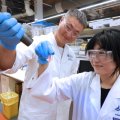The University of Queensland researchers are seeking to identify more effective ways of treating drug addiction to tackle the perceived prevalence of injecting drug use worldwide.
In 2009, United Nations Office on Drugs and Crime (UNODC) estimated there were 15–39 million problem drug users globally.
Professor Wayne Hall from UQ’s Centre for Clinical Research leads a research team that aims to find out what causes drug addiction and the associated burden of harm and disease it has on society.
“We are assessing the impact of neuroscience on how we think about and respond to addiction,” Professor Hall said.
“Ultimately these findings may influence governments to provide more effective new treatments.”
Professor Hall said many new ethical and policy implications surround innovative treatments.
“Among these are the possible use of the courts to force addicted individuals into treatment and proposals to trial deep brain stimulation to treat addiction,” Professor Hall said.
“Deep brain stimulation has proven very effective in treating Parkinsons’ Disease but there are questions about its appropriateness in treating addiction.”
The researchers are also examining ethical issues raised by proposals to monitor the use of illegal drugs in the community by measuring illicit drug residues and metabolites in waste water.
Professor Hall and Professor Louisa Degenhardt from the Burnet Institute, Melbourne, were involved in a recent study published in the Lancet that estimated 155–250 million people used an illicit drug worldwide in 2008.
These comprised about 129–191 million cannabis users; 16–38 million problem users of opioids, amphetamines, or cocaine; and 11–21 million people who injected drugs.
“Cannabis was far and away the most widely used illicit drug globally, but heroin and other opiates caused the most harm, followed by amphetamine-type stimulants and cocaine,” Professor Hall said.
“Among the most common harms were drug dependence, overdose deaths, accidents, violence, HIV-AIDS and other blood-borne infections.”
Some of the projects the team is working on include ‘The feasibility and ethical acceptability of vaccinating adolescents against the effects of nicotine to prevent cigarette smoking’.
The ‘Neurological insights into addiction’ article will be published today in the annual International Innovation journal for 2012.
Here Professor Hall speaks about his neurobiological research on addiction and the progress made to date.
Media Contact: Kate Sullivan, Marketing Communications Officer, UQ Centre for Clinical Research, 0421 819 807 or k.sullivan4@uq.edu.au
.jpg)










